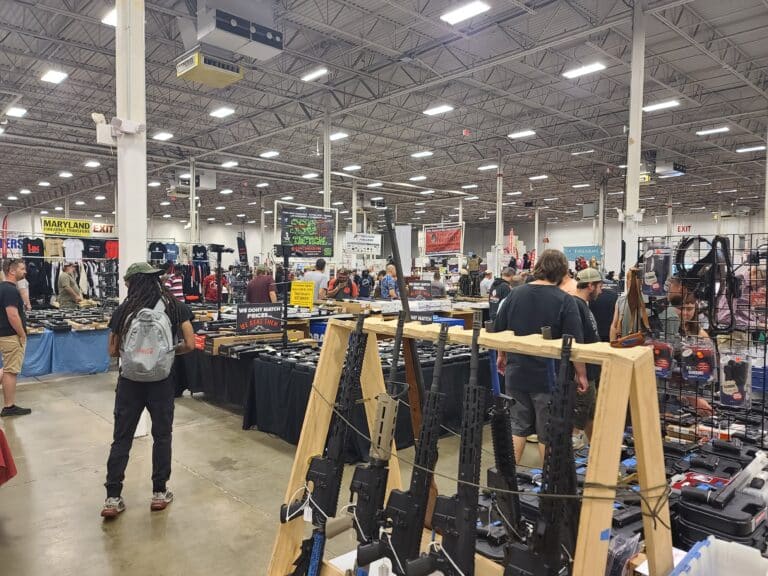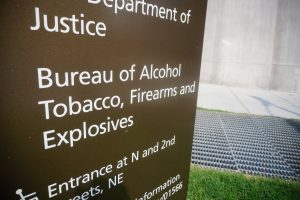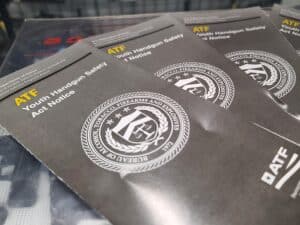President Joe Biden has announced a new proposal to expand the scope of federal gun dealing regulations to cover more people who sell used guns.
On Thursday, the Department of Justice submitted a new plan for determining who must obtain a federal firearms license to legally sell guns on the secondary market. The proposed rule would set limits on how frequently an unlicensed seller could offer up guns to customers, how often they can sell the same kind of gun, and what kind of condition the firearm has to be in before the seller would be required to get a Federal Firearms License (FFL). Anybody who violates the proposed regulations and sells a gun without a license could face up to $250,000 in fines and five years in federal prison or both.
“[U]nder the proposed rule, a person would be presumed to be required to become a licensed dealer and run background checks if they meet one or more of the following criteria,” the White House said in a release. “Offer for sale any number of firearms and also represents to potential buyers that they are willing and able to purchase and sell them additional firearms; Repetitively offer for sale firearms within 30 days after they were purchased; Repetitively offer for sale firearms that are like new in their original packaging; Repetitively offer for sale multiple firearms of the same make and model; or as a formerly federally-licensed firearms dealer, sell firearms that were in the business inventory and not transferred to a personal collection at least a year before the sale, addressing the so-called’ fire sale loophole.'”
The new proposal is the latest in a series of moves President Biden has undertaken to try and further tighten American gun regulations. With his legislative agenda on firearms hamstrung by a lack of support in Congress, he has instead attempted to unilaterally enforce new restrictions through federal rulemaking. However, his previous attempts to reclassify or ban parts kits for homemade guns and pistol-braced AR-15s have been found unconstitutional by multiple federal courts.
This latest attempt may be bolstered by a tweak in language Congress included in last year’s Bipartisan Safer Communities Act (BSCA), though. That law reworded the definition of who is “engaged in the business” of firearms dealing, and therefore needs to get an FFL, by removing the requirement that a seller is operating “with the principal objective of livelihood and profit” and inserting “to predominantly earn a profit.” The Biden Administration is using that language change to justify the new proposal.
“The Bipartisan Safer Communities Act was passed by Congress to reduce gun violence, including by expanding the background checks that keep guns out of the hands of criminals,” Attorney General Merrick Garland said in a statement. “This proposed rule implements Congress’s mandate to expand the definition of who must obtain a license and conduct a background check before selling firearms.”
If successful, it could significantly expand who must obtain an FFL before selling used guns. However, the proposal appears to stop well short of attempting to require everyone who sells a used gun to get a license before doing so.
The Reload reached out to the office of every senator who voted for the BSCA’s language change in recent weeks to get their view of what it meant. Only two offices responded to the requests. Senator John Cornyn (R., Texas), who was instrumental in negotiating the bipartisan bill, said the language was intentionally written to be limited in its application.
“This language is tailored towards individuals regularly selling guns to strangers with the predominant motive of making money through a side business, like the person who sold the Midland shooter his weapon, and it is drafted in such a way that prosecutors will need to prove specific intent on the part of the unlicensed seller,” Cornyn’s office said.
In regards to the administration’s specific proposal, his office said “the Biden admin should expect for this rule to be struck down because it is unconstitutional.”
Republican staffers have argued all the language change did was bring the statute in line with how the courts had already been interpreting the law. Federal convictions in cases dating to the 1970s, such as United States v. Gross, United States v. Huffman, and United States v. Wilkening, show people being convicted of dealing without a license under similar circumstances outlined in the new rule. Judges in those cases concluded somebody could be required to obtain an FFL if they repeatedly bought and sold a number of guns for profit or other financial gain in a short period of time, and the sales didn’t have to represent the seller’s primary source of income or even a tremendous amount of profit (with Wilkening making just $350 in his 1973 case.)
Still, Senator Joni Ernst (R., Iowa) said any efforts to move beyond the previous boundaries for licensing would go against Congress’s intent.
“President Biden is twisting the law to fit his liberal gun-grabbing agenda,” her office told The Reload. “His administration’s latest attack on lawful gun owners clearly oversteps both the intent and the text of the law, at the expense of the average gun seller. Senator Ernst has repeatedly defended FFL holders and will continue to stand up against the Biden administration’s attack on Second Amendment rights.”
The 108-page proposal from the Bureau of Alcohol, Tobacco, Firearms, and Explosives (ATF) provides further details on how the agency would interpret who needs to obtain a license. The longer definition it includes would also capture anyone who sells an illegal gun, anyone who spends more than their “reported taxable gross income during the applicable period of time” on guns they buy to resell, or repeatedly sells guns “of the same or similar kind (i.e., make/manufacturer, model, caliber/gauge, and action) and type (i.e., the classification of a firearm as a rifle, shotgun, revolver, pistol, frame, receiver, machinegun, silencer, destructive device, or other firearm).”
It further asserted that somebody may have to get an FFL even if they haven’t actually followed through on their intent to do any of the things that trigger the licensing requirement.
“The first presumption stated above—that a person will be presumed to be engaged in the business when the person sells or offers for sale firearms, and also represents to potential buyers or otherwise demonstrates a willingness and ability to purchase and sell additional firearms—reflects that the definition of ‘engaged in the business’ in 18 U.S.C. 921(a)(21)(C) does not require that a firearm actually to be sold by a person so long as the person is holding themself out as a dealer,” the ATF wrote. “This is because, under the definition of ‘engaged in the business’ in 18 U.S.C. 921(a)(21)(C), the ‘repetitive purchase and resale of firearms’ is the means through which the person intends to engage in the business even if those firearms are not actually repetitively purchased and resold.”
The agency argued the standard was consistent with the previous standard because courts have “upheld convictions for dealing without a license when few firearms, if any, were actually sold, provided other factors were also present, such as the person representing to others a willingness and ability to repetitively purchase firearms for resale.” The ATF also noted the rule doesn’t set any specific ceiling or floor for how many used guns an unlicensed person could sell before needing to get an FFL. It said the new standard would continue to allow the government to force people to obtain a license even if they only ever tried to sell one gun, depending on circumstances that it did not specifically lay out.
“[W]hile selling large numbers of firearms or engaging or offering to engage in frequent transactions may be highly indicative of business activity, neither the courts nor the Department has recognized a set minimum number of firearms purchased or resold that triggers the licensing requirement,” the agency wrote. “Similarly, there is no minimum number of transactions that determines whether a person is ‘engaged in the business’ of dealing in firearms. Instead, the established approach for determining whether an individual is ‘engaged in the business’ is to look at the totality of circumstances. Thus, even a single firearm transaction, or offer to engage in a transaction, when combined with other evidence, may be sufficient to require a license.”
The ATF also asserted Americans who sell used guns and don’t specifically fall into any of the categories it outlined in its rule could still be pursued for dealing guns without a license under some circumstances. The agency did not elaborate on what those other circumstances might be.
“The activities set forth in these rebuttable presumptions are not exhaustive of the conduct that may show that, or be considered in determining whether, a person is engaged in the business of dealing in firearms,” it wrote.
However, the agency did articulate its view of who would not be required to get an FFL under the proposal.
“[U]nder this proposed rule, a person would not be presumed to be engaged in the business requiring a license as a dealer when the person transfers firearms only as bona fide gifts, or occasionally sells firearms only to obtain more valuable, desirable, or useful firearms for their personal collection or hobby, unless their conduct also demonstrates a predominant intent to earn a profit,” the ATF wrote.
Once the proposed rule is published in the federal register, the public will have 90 days to send in comments on it.
UPDATE 8-31-2023 4:33 PM EASTERN: This piece has been updated to include comment from Senators Cornyn and Ernst as well as further details on the proposed rule.






